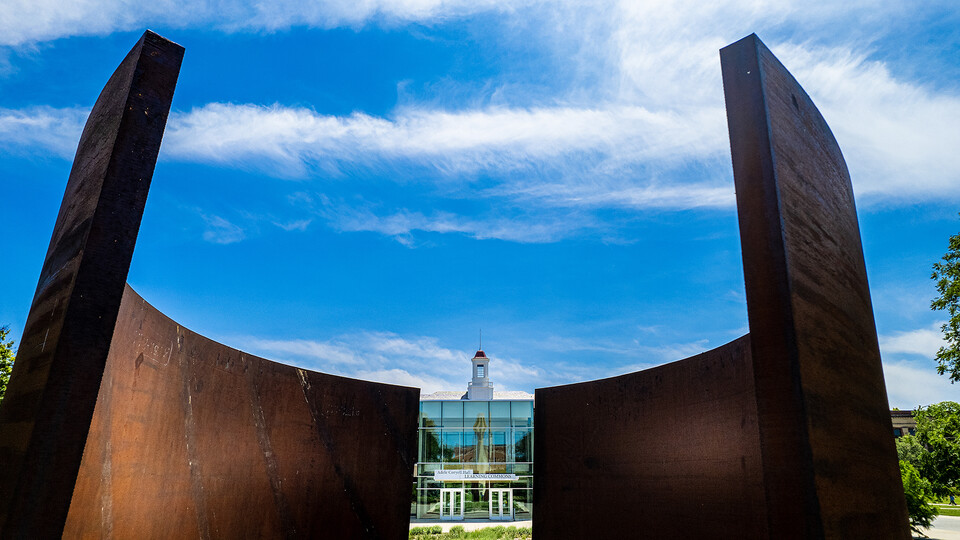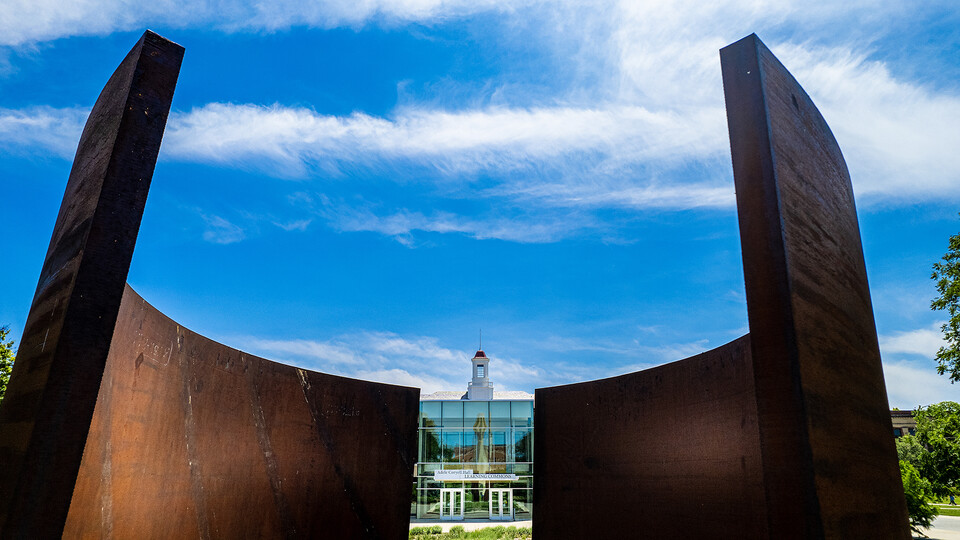
A groundbreaking study on extinctions and the discovery of the first virus-eating microorganism are among stories that made national and international news for the University of Nebraska–Lincoln in 2022.
-
Will Gearty, postdoctoral researcher in biological sciences; Kate Lyons, assistant professor of biological sciences; and a four-continent team found that extinctions of the largest herbivores and carnivores are disrupting what appears to be a fundamental feature of past and present ecosystems. Stories on the research appeared in Cosmos, Earth.com, The Independent, Phys.org and United Press International. Yahoo! News U.K. picked up The Independent’s story.
-
John DeLong, associate professor of biological sciences, and colleagues found that a species of Halteria — microscopic ciliates that populate freshwater worldwide — can eat huge numbers of infectious chloroviruses that share their aquatic habitat. For the first time, the team’s lab experiments have also shown that a virus-only diet, which the team calls “virovory,” is enough to fuel the physiological growth and even population growth of an organism. Stories on the research appeared in Gizmodo, IFL Science, Popular Science, Salon, Yahoo! News and more than 50 other media outlets.
Inventors, innovators and trailblazers
-
A recent study by Olivia Checkalski, a doctoral student in psychology; Sarah Gervais, professor of psychology; and Kathryn Holland, assistant professor of psychology and women’s and gender studies, found that women who send nude photos of themselves on their smartphone usually do so because they feel it’s expected of them by their partners. The most common reason, chosen by just over a third of questionnaire participants, was that they saw it as “an obligation or inherent part of being in a romantic relationship.” The Daily Mail published a Dec. 26 article on the research.
-
“The Bell Affair,” the inaugural feature-length film from Kwakiutl Dreher, associate professor of English; William G. Thomas III, Angle Chair in the Humanities and professor of history; and Michael Burton, assistant professor of art and design, made its public premiere June 2. The film chronicles an enslaved family’s fight for freedom in the mid-1800s. Stories on the film appeared on WYPR’s “On the Record” program on May 19 and in The Washington Informer on June 2.
-
Noori Choi, a recent doctoral graduate of Nebraska; Eileen Hebets, Charles Bessey Professor of biological sciences; and colleagues have found that females of the Schizocosa stidulans spider seem to reward males that produce more complex mating signals. Stories on the research appeared in the Daily Mail, Earth.com, The Independent, Live Science and Yahoo! News.
Trusted experts and recognized authorities
-
Courtney Hillebrecht, Samuel Clark Waugh Professor of international relations and director of the Forsythe Family Program on Human Rights and Humanitarian Affairs, was featured in several stories on the challenges of prosecuting Russia for war crimes in Ukraine. “If Russia does not cooperate with the (International Criminal Court) or other international courts in times of peace, what can we expect in times of war?” she wrote in a March 21 guest column for The Washington Post’s Monkey Cage blog. She also discussed the topic for April articles in The Daily Beast and Politifact.
-
The Targeted Observation by Radars and UAS of Supercells (TORUS) project continued to draw national interest last year. The New York Times followed the 17-member, multi-institutional team this summer as it crisscrossed the Great Plains, from Texas to the Canadian border, using high-tech instruments to gather data on supercell thunderstorms. Adam Houston, professor of Earth and atmospheric sciences and team leader, was featured in the Sept. 8 article. He was also a guest on the WeatherBrains podcast on July 19 and WHYY’s The Pulse program on Nov. 11.
-
Jocelyn Bosley, Office of Research and Economic Development, September on National Children’s Museum’s STEAM Daydream podcast, helped youth figure out how a magician used science to zap people in “A Shocking Truth.”
-
Dawn O. Braithwaite, communication studies, May in Huffington Post, what parents should consider when introducing their children to a new dating partner; June on KQED, chosen family; July in Psychology Today, how people live both independently and together in close relationships; August in Psychology Today, when family estrangement is the healthiest choice; September in Psychology Today, research on how parents can talk about their mental health with their children.
-
Kelsey Burke, sociology, and Emily Kazyak, sociology and women’s and gender studies, November in The Washington Post, their research on Americans’ support for transgender rights.
-
Joy Castro, English and ethnic studies, January in The New York Times, guest column on HBO’s “And Just Like That.”
-
Deirdre Cooper Owens, history, December in The 19th, cruel origins of American gynecology.
-
Kwame Dawes, English, January/February issue of The American Poetry Review, featured on cover, five of his poems featured; September in The Atlantic, his poem “The Widow’s Elegy” featured; December in The New York Times, his poem “Advent” featured.
-
John Hibbing, political science, May on NPR, Nebraska’s Republican gubernatorial primary; June in Roll Call, Mike Flood’s victory in special election; August in The Hill, Nebraska’s 1st Congressional District race; October in The Associated Press, how midterm election might affect Nebraska Republicans’ efforts to ban abortion in the state.
-
Qi “Steve” Hu, Earth and atmospheric sciences, June in Environmental News Network, The Indian Express and Nature, study he co-authored showing that desert climates have spread north in parts of central Asia since the 1980s.
-
Carole Levin, history, September in Forbes, #AbolishtheMonarchy trending on social media following Queen Elizabeth II’s death.
-
Patrice McMahon, political science and University Honors Program, June in The Conversation, advice for “grassroots humanitarians” eager to help Ukraine; August in The Conversation, Poland’s response to Ukrainian refugees.
-
Laura K. Muñoz, history and ethnic studies, October in USA Today, Latinos in the United States losing their Spanish fluency.
-
Chigozie Obioma, English, January in The Guardian, his second novel, “An Orchestra of Minorities,” highlighted in list of top 10 novels inspired by Greek myths; January in Los Angeles Times, his contribution to anthology “Anonymous Sex”; May in Book Riot, “An Orchestra of Minorities” highlighted in list of top books inspired by Greek myths; October in The Guardian, guest article on top 10 books about Nigeria.


